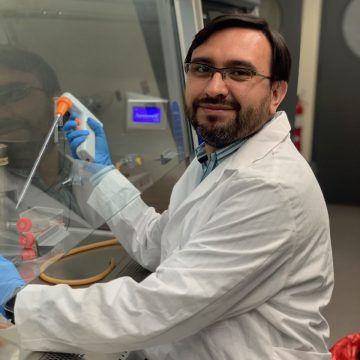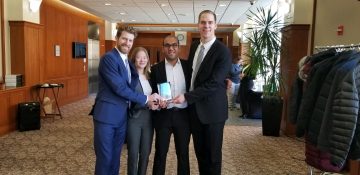Highlights from Announcements 3/9/20

Graduate Community Considerations for Novel Coronavirus (COVID-19)
We encourage all Graduate School community members to monitor Cornell’s official Novel Coronavirus (COVID-19) Resources and Updates page which contains the University’s most recent information and directions, based on guidance from the World Health Organization (WHO) and the U.S. Centers for Disease Control and Prevention (CDC). COVID-19 cases have been confirmed in over 80 countries, and growing, in virtually every region of the globe, including the WHO regions of Americas, Africa, Eastern Mediterranean, Europe, South East Asia, and Western Pacific.
COVID-19/Novel Coronavirus, like any virus, does not discriminate based on race, ethnicity, or country of origin. The CDC cautions against associating disease-related stigma with individuals from any country, emphasizing that fear and anxiety about a disease can lead to social stigma toward certain ethnic groups and indicating “Stigma hurts everyone by creating more fear or anger towards ordinary people instead of the disease that is causing the problem. We can fight stigma and help not hurt others by providing social support.” The CDC encourages that we communicate the facts that being of a certain ethnicity or citizenship “does not increase the chance of getting or spreading COVID-19.”
It is critical for all members of our community to be vigilant about hygiene as a prevention measure for the spread of viruses and other germs, and to be vigilant about adhering to our institutional core values, especially our core value to create a community of belonging. If we as institution and community are to live up to our stated value of diversity and inclusion, we must each resolve to proactively contribute to creating an environment of respect that is welcoming, caring, equitable, and supportive, and that recognizes and values the many different backgrounds, perspectives, abilities, and experiences represented within our community.
Graduate community members may feel anxious about this evolving public health situation or have concerns about friends and family living in areas currently experiencing the outbreak. Support resources are available:
- Students on the Ithaca campus may contact Counseling & Psychological Services (CAPS). Other helpful resources include “Let’s Talk” consultation and EARS peer counseling.
- Students at Cornell Tech may contact Student Services for support.
- Faculty and staff in Ithaca and New York City may contact the Faculty and Staff Assistance Program (FSAP).
- Reporting Bias, Harassment and Discrimination – To report bias incidents or related concerns, please complete this form or send an email to report_bias@cornell.edu. Know that confidential care and support for individuals affected by bias is available. More information about Cornell’s bias reporting system is available. Cornell is committed to maintaining a bias-free climate based on civility, decency, and respect. If you would like to speak with someone within the Graduate School about the various options that are available for reporting, please contact the Graduate School Office of Inclusion and Student Engagement at (607) 255-5417 or grad_assoc_dean@cornell.edu, or the Graduate School Office of Graduate Student Life, at 607-255-5184 or janna.lamey@cornell.edu.
Alumnus/Postdoc Spotlight: Javier Jaimes, Ph.D.
 Javier Jaimes is an alumnus of the microbiology program at Cornell from which he holds a Ph.D. Now, as a postdoctoral scholar in microbiology and immunology, he is studying virology with a concentration on coronavirus.
Javier Jaimes is an alumnus of the microbiology program at Cornell from which he holds a Ph.D. Now, as a postdoctoral scholar in microbiology and immunology, he is studying virology with a concentration on coronavirus.
Read the full student spotlight
Interested in what other graduate students are doing both on and off campus?
Check out our student spotlights, Q&As with current students about their research, hobbies, and experiences at Cornell.
Spotlight on Cornell Resources: University Ombudsman
The Office of the University Ombudsman is a safe place where any member of the Cornell community can discuss academic or non-academic concerns. The office is confidential and conversations are off-the-record. Some of the reasons graduate and professional students visit the office:
- difficulties with advisor or graduate committee
- ethical questions
- harassment or bullying
- unfair treatment
Some of the ways an ombudsman can help:
- provide you with information on university policies and practices
- assist you in evaluating available options
- refer you to the proper authority to resolve the situation
- coach you for a difficult conversation
- act as a nonjudgmental sounding board
No issue is considered too small or too large.
To schedule an appointment:
Call: 607-255-4321
Email: ombudsman@cornell.edu
Learn more about the Office of the University Ombudsman
Kudos!
Four MILR Students Win 2020 HR Invitational Case Competition
 Four MILR students – Sudip Roy, Ming Liu, Ethan Call, and Nate Mladenovic – won first prize among eight competing teams in the 2020 HR Invitational Case Competition at Ohio State University on February 22. On a case about increasing participation in flexible work programs while sustaining key operational metrics at Eaton Corporation (the sponsoring company), the judges greatly appreciated their strategic thinking, presentation skills, and presentation technique. The students were chosen by Chris Collins, associate professor of human resource studies and director of graduate studies in ILR. The trip was sponsored by the Center for Advanced Human Resources (CAHRS).
Four MILR students – Sudip Roy, Ming Liu, Ethan Call, and Nate Mladenovic – won first prize among eight competing teams in the 2020 HR Invitational Case Competition at Ohio State University on February 22. On a case about increasing participation in flexible work programs while sustaining key operational metrics at Eaton Corporation (the sponsoring company), the judges greatly appreciated their strategic thinking, presentation skills, and presentation technique. The students were chosen by Chris Collins, associate professor of human resource studies and director of graduate studies in ILR. The trip was sponsored by the Center for Advanced Human Resources (CAHRS).
Doctoral Candidate’s Crop Protection Treatment to be Tested in Upstate NY
 Nicholas Aflitto, a doctoral candidate in entomology with a focus on chemical ecology, has been developing a new crop protection treatment for Colorado potato beetles that uses a synthetic pheromone of one of their predators. Over the course of his Ph.D. research, he has used lab and large-scale field trials to show that this international potato pest consumes less plant material and avoids plots containing the odors of its predator. He recently finished the USDA National Organic Program compliance process and the pheromone blend is now approved for use in organic agriculture. This summer Aflitto will bring this new treatment to a large organic farm in Upstate New York and test it on additional varieties of potatoes as well as eggplant.
Nicholas Aflitto, a doctoral candidate in entomology with a focus on chemical ecology, has been developing a new crop protection treatment for Colorado potato beetles that uses a synthetic pheromone of one of their predators. Over the course of his Ph.D. research, he has used lab and large-scale field trials to show that this international potato pest consumes less plant material and avoids plots containing the odors of its predator. He recently finished the USDA National Organic Program compliance process and the pheromone blend is now approved for use in organic agriculture. This summer Aflitto will bring this new treatment to a large organic farm in Upstate New York and test it on additional varieties of potatoes as well as eggplant.

